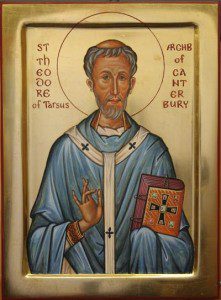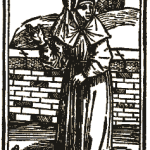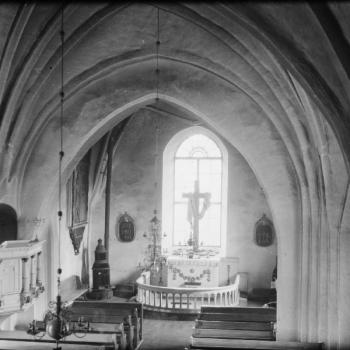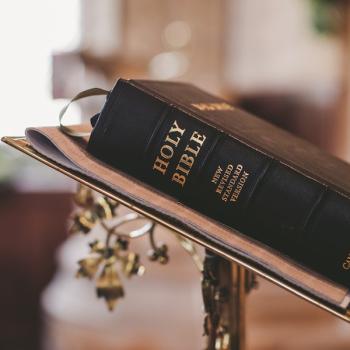
What follows is a personal and somewhat speculative attempt to understand the relationship between Pope Francis and his often traditionalist critics. I intend it to be a preliminary investigation, not the final word. Please, dear reader, accept it in that spirit.
Here at Patheos Catholic, we’ve recently seen a proliferation of articles delineating the various subsets of the Church; from “fundamentalist traditionalists” to “liberals,” the work of compartmentalization remains popular. Some of these pieces have got me thinking: what is it that has Pope Francis in hot water with so many Catholics? The argument typically goes that this is a question of “conservative” v. “liberal” Catholics, that the hardliners find his ambiguity troubling while those interested in innovation kiss his feet.
But, I am not interested in innovation, and I love him. Something else must be afoot.
For the last few months, I’ve been attending a Ruthenian Catholic Church, one of the 23 sui iuris Churches contained within the Catholic Church as a whole (information on that idea here), and among the most amazing changes has been the dissolution of most Church politics as most Catholics would understand it. Whether from everyday laymen or bi-ritual priests (those who can celebrate either the Mass or the Divine Liturgy), I have seen very little interest, either in person or online, in the “problems” that seem to obsess so many of my Latin friends. Most are just happy to have their liturgical and ecclesial autonomy while maintain union with the servus servorum Dei. This got me thinking: is the anger, in part, the manifestation of a certain Latin Christianity?
From what I observed, it’s a common criticism, right or not, that Latin Christians are too rule-obsessed. Take this example from an Orthodox Christian website:
Orthodox theologians reacted negatively to the new dogmas proclaimed by Pope Pius IX: the Immaculate Conception of Mary (1854) and papal infallibility (1870). In connection with the dogma of the Assumption of Mary, proclaimed by Pope Pius XII (1950), the objections mainly concerned the presentation of such a tradition in the form of a dogma.
In contrast to the recent general trend of Western Christian thought toward social concerns, Orthodox theologians generally emphasize that the Christian faith is primarily a direct experience of the Kingdom of God, sacramentally present in the church. Without denying that Christians have a social responsibility to the world, they consider this responsibility as an outcome of the life in Christ. This traditional position accounts for the remarkable survival of the Orthodox Churches under the most contradictory and unfavourable of social conditions, but, to Western eyes, it often appears as a form of passive fatalism.
To put it bluntly, many Orthodox, or even just non-Latins I’ve met (including Catholics) see the Roman Church as always interested in delineation, that is in establishing clear and obvious categories. The problem is rarely with Latin beliefs per se, and more with the mode of their presentation; as the piece above states, “the objections mainly concerned the presentation of such a tradition in the form of a dogma.”
The Byzantine Churches have their own problems (I’ve noticed especially as regards a sort of ethnic protectionism that is understandable, though ultimately, I think, negative), but they might be on to something here. This might be why David Bentley Hart, though himself from the West, has had trouble wrapping his head around the opposition to Francis. Even Latin Catholic responses to the issue have, without making it terribly explicit, noted this phenomenon:
If the philosophical and even dogmatic precision of Pope John Paul II or Benedict XVI tended to make “progressive” or “doctrinally uncommitted” Catholics nervous, so too does the lack of these personality traits in Pope Francis make “conservative” or “doctrinally committed” Catholics nervous. Nothing could be more natural. All of us need to realize that this nervousness—far from being incomprehensible—is deeply rooted in real and even obvious causes.
Others have only barely grazed the idea, associating it with a sentimental bitterness, a longing for the more dogmatically-defined days of John Paul II and Benedict XVI:
Many Catholics viewed Pope Benedict as an intellectual giant, one of the last great men of Europe. They saw in him an ally in their fight for liturgical beauty and a man of philosophical brilliance. He is undeniably all of those things, but along the way in some quarters that admiration gave way to a sentimentalist hero worship. As O’Connor wrote, sentimentalism is a softness that leads to bitterness.
Many Catholics were stricken when Pope Benedict abdicated but they believed or stridently hoped that an even more tradition-friendly Pope would be elected and when Francis was elected they were confused, and as Pope Francis’s pontificate has gone on this confusion has turned to bitterness.
This bitterness is the result of viewing the papacy through a lens of sentimentality. Taking a sentimental view of life is immature and spiritually damaging and when the sentimentalist is inevitably scandalized by human nature he will likely spread his scandal to others.
I wonder if what we are not seeing is a sort of non-Latin leader of the Latin Church, whose style and mode are merely out-of-step with the most rigorous defenders of his tradition. This tension has existed for a long time in the Latin Church. Take the Beguine communities of the high and late Middle Ages, whose mystical and non-dogmatic approach got them in trouble, despite their not actually practicing or believing heresy (their ideas are found in orthodox thinkers like Hadewijch of Brabant, Mechthild of Magdeburg, and Meister Eckhart). Pope Francis has something of a non-dogmatic mind, not mystical, though also not scholastic. Pastoral might be the right term.
This is not to say he’s an Eastern mind, not even close. But his mode of teaching and praying might be non-Latin, as the tradition has come to define itself, especially post-Vatican I; in this sense, it is an institution serviced by and always making use of various canonical rules to define its beliefs in abundant detail. While all Apostolic Christians hold certain dogmatic beliefs, the Latin Church (within the Catholic Church) has been the most zealous in championing, promulgating, and defining ever new areas of theological understanding. Francis is no Pius IX, X, or XII, that is, he’s not of a delineating mind. Byzantine Catholics, who are not generally of this mindset, are often unconcerned about Communion for the divorced, the marriage of priests, and even contraception, because in Byzantine theology these areas are treated as ambiguous and in need of reflection, not immediate and clear rule-making.
Obviously, this view can drive those of a certain Latin mindset mad. The key, however, is to recognize that the Latin paradigm is not the end-all-be-all of Catholicism, nor of Christianity. Whether you like or dislike Pope Francis, his non-rule-obsessed thinking is not in-and-of-itself not Catholic. His papacy is, perhaps, a reminder that there are other modes of thinking within the true Faith, and while I think Byzantines have a good deal to learn from Latins, I think the reverse is also true. If nothing else, from general theology to the papacy, I know I have learned much from listening to my Byzantine brethren. Our first step toward more compassionate criticism of the pope (and perhaps the eventual reunion of all Apostolic Christians) might be just this ability to recognize the Faith in one another.
May we all enter into criticism of the Holy Father and the Church from this perspective of openness and love.













